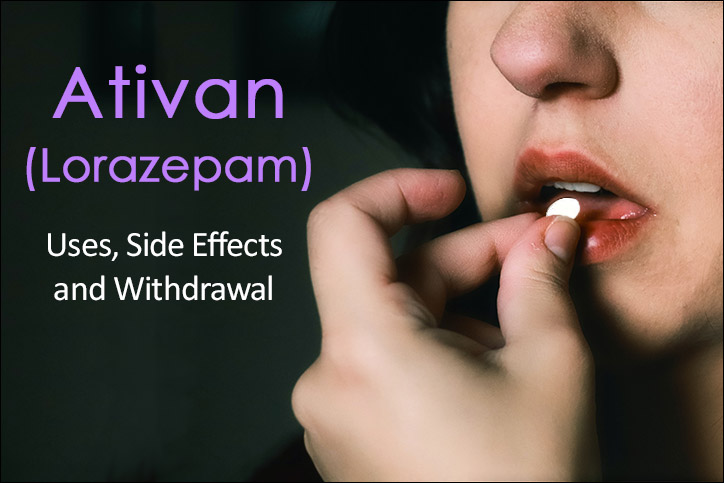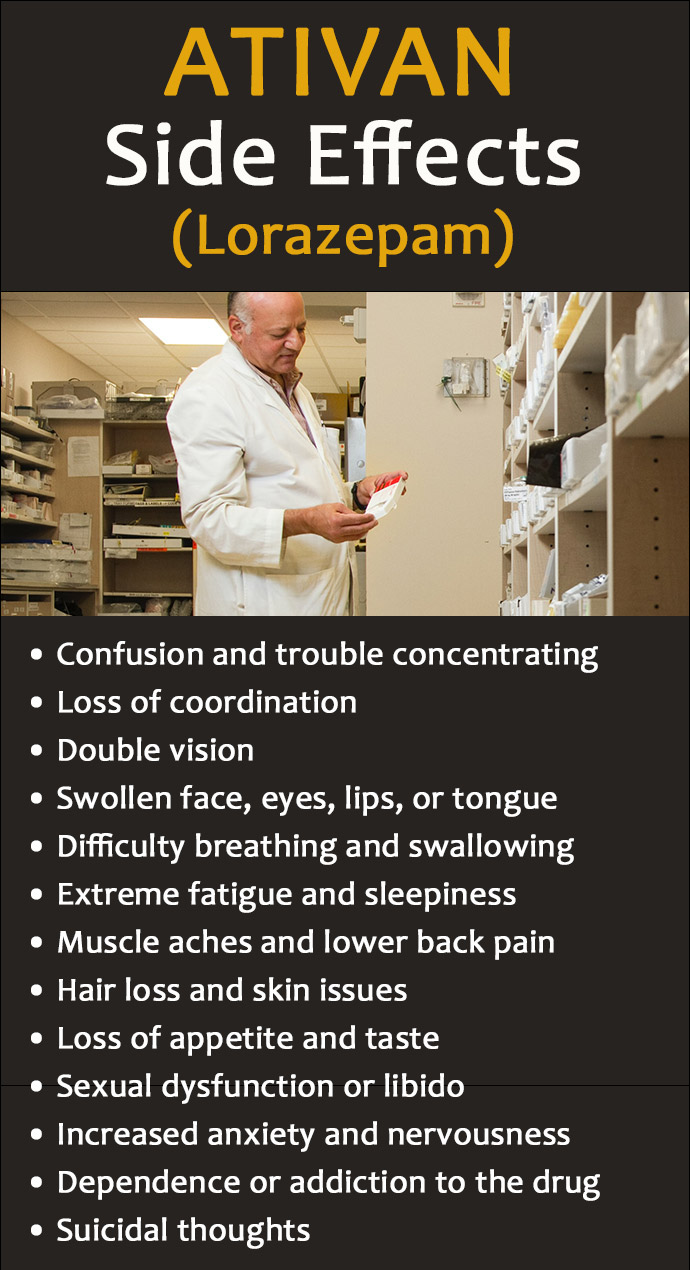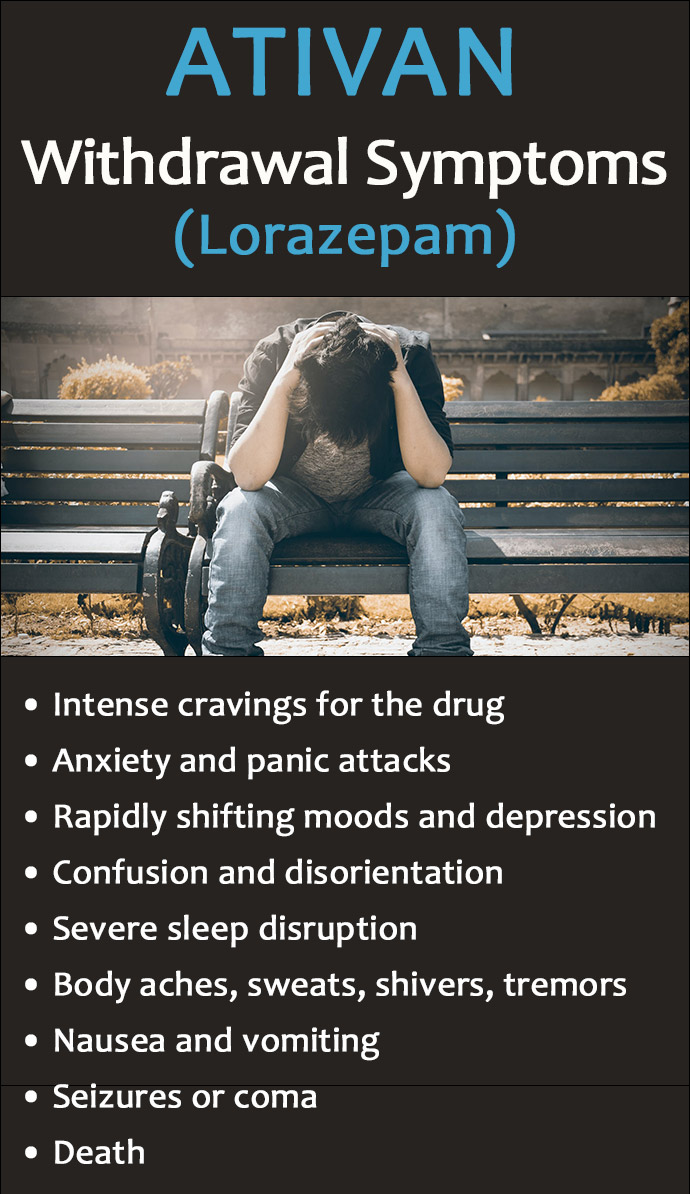Table of Contents
There are many types of benzodiazepines, and each works a bit differently than the others. Understanding Lorazepam or Ativan side effects and withdrawal symptoms is important, even for anyone who has used other forms of benzos in the past.
Certain prescription drugs are often necessary to improve mental or physical health although they sometimes come with other unwanted and dangerous issues, especially when the medication is potentially habit forming and addictive.
Research from the National Institute on Drug Abuse (NIDA) shows that more than 17 percent of people taking benzodiazepines misuse them, and that these prescription drugs can be associated with substance abuse, mental disorders, and emergency room visits.
Like other benzodiazepines, Ativan side effects can lead to addiction and withdrawal symptoms if misused or abused.
What is Ativan (Lorazepam)?
Ativan is the brand name of the generic drug lorazepam, a type of benzodiazepine similar to Xanax, Valium, and Klonopin.
Like other benzos, Ativan has a tranquilizing or calming effect on the central nervous system. The drug interacts with neurotransmitters in the brain that lead to a sedative-like effect, along with muscle relaxation.
While the medication has anticonvulsant properties that are useful for controlling seizures and panic attacks, it can lead to a coma when abused or mixed with other substances, like alcohol.
One of the reasons benzodiazepines are so habit forming is because of the relaxed and calming state users feel when they take this central nervous system depressant.
Ativan is only approved for short-term use. Taking benzodiazepines for longer periods of time can significantly increase the likelihood of dependence, addiction, or withdrawal symptoms.
What is Ativan Used For?
The main Ativan uses are for the treatment of panic and anxiety issues related to Generalized Anxiety Disorder. The drug is also given to help people suffering from continuous seizures.
There are however, some other effective uses for Ativan and lorazepam .
Sometimes Ativan is used for patients suffering from insomnia or other sleep issues caused by stress and anxiety.
Additionally, benzodiazepines like lorazepam have shown to be useful, in the short term, for people battling painful withdrawal symptoms from alcohol abuse.
Ativan Side Effects of Lorazepam
Taking Ativan (lorazepam) as prescribed by a doctor is critical. Taking a higher dose of a benzodiazepine or mixing this type of medication with alcohol or other drugs can intensify the side effects of Ativan and lead to dangerous symptoms.
Common Ativan side effects can include some of the following:
- Problems concentrating, confusion, and disorientation
- Loss of coordination
- Double vision
- Swollen face, eyes, lips, and tongue
- Difficulty breathing and swallowing
- Extreme fatigue and sleepiness
- Muscle aches and lower back pain
- Hair loss and skin issues, such as hives or irritation
- Loss of appetite and even the ability to taste food
- Sexual dysfunction, such as the inability to get aroused, or a diminished libido
- Increase in anxiety related symptoms, depression, and nervousness
- Developing a physical dependence to the drug that can lead to addiction
- Suicidal thoughts
Long-term Ativan side effects
- Tolerance to the drug
- Cognitive impairment
- Developing a physical or emotional dependence to the drug
- Addiction
Many of these Ativan side effects may require immediate medical attention or lead to more serious issues without treatment. Mayo Clinic offers a complete list of lorazepam side effects.
Once a dependency or Ativan addiction occurs, it can be particularly difficult for a person to stop taking the drug, despite its many dangers.
Experiencing Ativan withdrawal symptoms or from other benzodiazepines often keeps people in a cycle of use and misuse.
Ativan Withdrawal Symptoms
One reason Ativan and other benzodiazepines are so habit forming is that people with a prescription to the medication can unknowingly develop a dependency from even short-term use of the drug.
A physical dependence to the medication can happen in as little as a few weeks of daily use.
The sedative or calming effects of Ativan can be particularly compelling and lead a person to feel that there is little harm in taking more than prescribed, or taking the drug for longer than needed.
However, once the brain and body become physically dependent to the drug, it can be extremely painful or uncomfortable, and even dangerous to simply stop taking Ativan all at once.
This is why healthcare experts do not recommend that a person with a dependency or addiction to benzodiazepines give up the medication “cold turkey.” The severe withdrawal symptoms must be properly treated because they can be fatal in some cases.
Withdrawal symptoms from Ativan may include some of the following:
- Intense physical cravings for the medication
- Increased anxiety and panic attacks
- Rapidly shifting moods, from depression to extreme irritability
- Confusion, disorientation, problems focusing or concentrating
- Severe sleep disruption that worsens all other symptoms
- Body aches, headaches, sweats, shivers, and tremors
- Nausea and vomiting
- Seizures or coma
- Death
Addiction to Ativan and other benzodiazepines is treatable, but detox and withdrawal symptoms from the drug must be monitored by medical professionals.
Ativan Withdrawal and Detox Treatment
Recovery from Ativan addiction is possible, although it usually requires professional benzodiazepine treatment at a medically supervised facility.
The first step for treatment is detox to manage Ativan withdrawal symptoms.
In some cases, patients in treatment may be given other medications during drug detox to ease severe withdrawal symptoms related to benzodiazepine dependency.
It’s also important for medical staff to be on hand in case a person experiences any life-threatening complications during detox and withdrawal.
The acute phase of Ativan withdrawal can last up to two weeks, though it can be longer for patients who have a history of taking high doses of the drug, or using it for extended periods of time.
Unlike most other addictive drugs, benzodiazepines like Ativan require a taper period to slowly and safely wean a person off of the drug, instead of stopping use abruptly.
Addiction recovery treatment can only get started after Ativan withdrawal and detox has been completed.
Ativan addiction treatment for those who are dependent on the medication can involve one-on-one or group counseling, as well as other forms of therapy to identify and treat the underlying causes of addiction.
Cognitive Behavioral Therapy (CBT) can be effective for teaching people how to cope with, and overcome triggers that may lead to relapse.
Other therapies will work on finding solutions for issues that led a person to begin using Ativan, such as stress, anxiety, and sleeping problems.
Seeking treatment for Ativan side effects, addiction, and withdrawal is most effective at an inpatient facility that provides full-time support and care in an appropriate environment for patients to heal.





